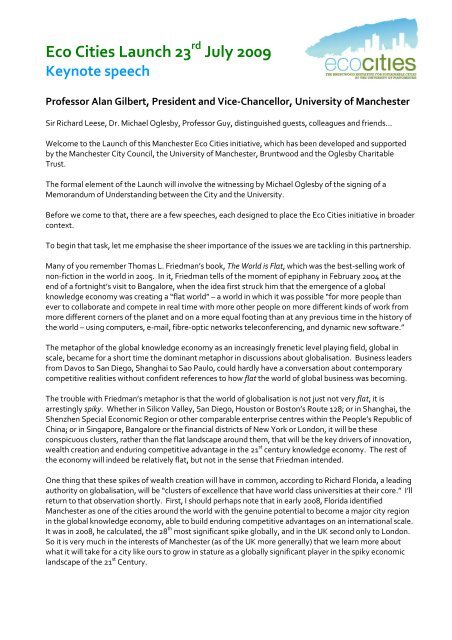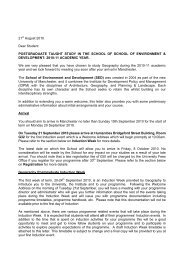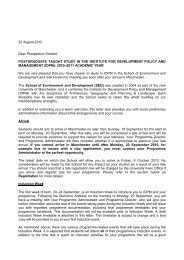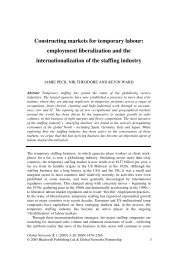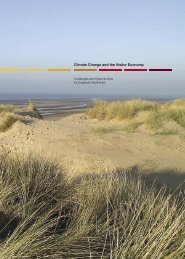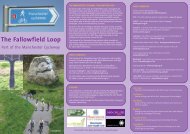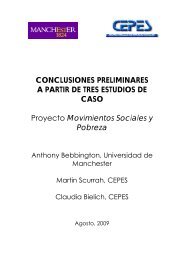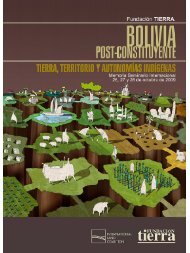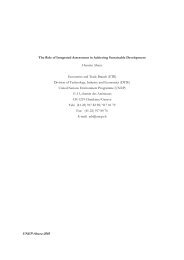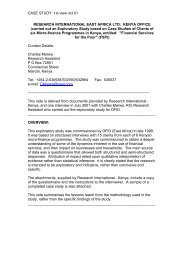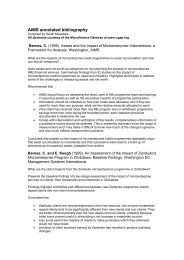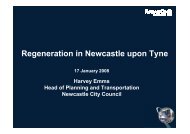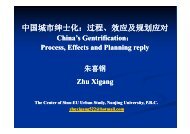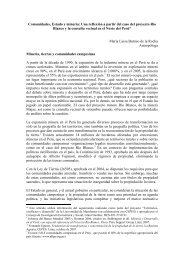Keynote speech - Prof Alan Gilbert - School of Environment and ...
Keynote speech - Prof Alan Gilbert - School of Environment and ...
Keynote speech - Prof Alan Gilbert - School of Environment and ...
Create successful ePaper yourself
Turn your PDF publications into a flip-book with our unique Google optimized e-Paper software.
Eco Cities Launch 23 rd July 2009<br />
<strong>Keynote</strong> <strong>speech</strong><br />
<strong>Pr<strong>of</strong></strong>essor <strong>Alan</strong> <strong>Gilbert</strong>, President <strong>and</strong> Vice-Chancellor, University <strong>of</strong> Manchester<br />
Sir Richard Leese, Dr. Michael Oglesby, <strong>Pr<strong>of</strong></strong>essor Guy, distinguished guests, colleagues <strong>and</strong> friends…<br />
Welcome to the Launch <strong>of</strong> this Manchester Eco Cities initiative, which has been developed <strong>and</strong> supported<br />
by the Manchester City Council, the University <strong>of</strong> Manchester, Bruntwood <strong>and</strong> the Oglesby Charitable<br />
Trust.<br />
The formal element <strong>of</strong> the Launch will involve the witnessing by Michael Oglesby <strong>of</strong> the signing <strong>of</strong> a<br />
Memor<strong>and</strong>um <strong>of</strong> Underst<strong>and</strong>ing between the City <strong>and</strong> the University.<br />
Before we come to that, there are a few <strong>speech</strong>es, each designed to place the Eco Cities initiative in broader<br />
context.<br />
To begin that task, let me emphasise the sheer importance <strong>of</strong> the issues we are tackling in this partnership.<br />
Many <strong>of</strong> you remember Thomas L. Friedman’s book, The World is Flat, which was the best-selling work <strong>of</strong><br />
non-fiction in the world in 2005. In it, Friedman tells <strong>of</strong> the moment <strong>of</strong> epiphany in February 2004 at the<br />
end <strong>of</strong> a fortnight’s visit to Bangalore, when the idea first struck him that the emergence <strong>of</strong> a global<br />
knowledge economy was creating a “flat world” – a world in which it was possible “for more people than<br />
ever to collaborate <strong>and</strong> compete in real time with more other people on more different kinds <strong>of</strong> work from<br />
more different corners <strong>of</strong> the planet <strong>and</strong> on a more equal footing than at any previous time in the history <strong>of</strong><br />
the world – using computers, e-mail, fibre-optic networks teleconferencing, <strong>and</strong> dynamic new s<strong>of</strong>tware.”<br />
The metaphor <strong>of</strong> the global knowledge economy as an increasingly frenetic level playing field, global in<br />
scale, became for a short time the dominant metaphor in discussions about globalisation. Business leaders<br />
from Davos to San Diego, Shanghai to Sao Paulo, could hardly have a conversation about contemporary<br />
competitive realities without confident references to how flat the world <strong>of</strong> global business was becoming.<br />
The trouble with Friedman’s metaphor is that the world <strong>of</strong> globalisation is not just not very flat, it is<br />
arrestingly spiky. Whether in Silicon Valley, San Diego, Houston or Boston’s Route 128; or in Shanghai, the<br />
Shenzhen Special Economic Region or other comparable enterprise centres within the People’s Republic <strong>of</strong><br />
China; or in Singapore, Bangalore or the financial districts <strong>of</strong> New York or London, it will be these<br />
conspicuous clusters, rather than the flat l<strong>and</strong>scape around them, that will be the key drivers <strong>of</strong> innovation,<br />
wealth creation <strong>and</strong> enduring competitive advantage in the 21 st century knowledge economy. The rest <strong>of</strong><br />
the economy will indeed be relatively flat, but not in the sense that Friedman intended.<br />
One thing that these spikes <strong>of</strong> wealth creation will have in common, according to Richard Florida, a leading<br />
authority on globalisation, will be “clusters <strong>of</strong> excellence that have world class universities at their core.” I’ll<br />
return to that observation shortly. First, I should perhaps note that in early 2008, Florida identified<br />
Manchester as one <strong>of</strong> the cities around the world with the genuine potential to become a major city region<br />
in the global knowledge economy, able to build enduring competitive advantages on an international scale.<br />
It was in 2008, he calculated, the 28 th most significant spike globally, <strong>and</strong> in the UK second only to London.<br />
So it is very much in the interests <strong>of</strong> Manchester (as <strong>of</strong> the UK more generally) that we learn more about<br />
what it will take for a city like ours to grow in stature as a globally significant player in the spiky economic<br />
l<strong>and</strong>scape <strong>of</strong> the 21 st Century.
One thing we know, for certain, is that the global economy is already well on the way to becoming a<br />
“knowledge economy”, dependent on a reliable flow <strong>of</strong> world class knowledge workers, innovative ideas<br />
<strong>and</strong> ipso facto, knowledge institutions such as universities. Hence Richard Florida’s observation that,<br />
among the defining characteristics <strong>of</strong> all the globally significant economic spikes, will be the presence <strong>of</strong> a<br />
great university – or a number <strong>of</strong> great universities.<br />
That truth is important in the context <strong>of</strong> today’s Launch <strong>of</strong> the Eco Cities initiative, but so (even more) is<br />
another prerequisite <strong>of</strong> city region success. Great global cities henceforth will have no option whatsoever but<br />
to be environmentally responsible <strong>and</strong> sustainable. They will have to be Eco Cities – clean, green <strong>and</strong><br />
sustainable – or they will be uncompetitive.<br />
Cities ignoring the imperative <strong>of</strong> sustainability will not only be regulated out <strong>of</strong> competitive existence by<br />
national Governments enforcing international protocols, but the world class knowledge workers <strong>and</strong><br />
creative classes with global choices will simply refuse to live in them.<br />
But knowing how vital it is, on the one h<strong>and</strong>, <strong>and</strong>, on the other, actually achieving the reality <strong>of</strong><br />
environmental sustainability within our own City, are (unfortunately) two vastly different things.<br />
Recognising that truth is easy; but the deep underst<strong>and</strong>ing <strong>and</strong> sheer hard work necessary to create “Eco<br />
City Manchester” is going to be hard. The targets will be dem<strong>and</strong>ing <strong>and</strong> competition from other cities<br />
around the world will be intense.<br />
That is why today’s Launch is important. It is both the Launch <strong>of</strong> a practical initiative <strong>and</strong> the affirmation <strong>of</strong><br />
a binding commitment by the various parties to take the challenging “Eco City Manchester” agenda with<br />
uncompromising seriousness. For the stakes are astronomical. We will either succeed in making<br />
Manchester an ecologically sustainable city, or Manchester’s hopes <strong>of</strong> playing a major national <strong>and</strong> global<br />
role in the decades ahead will falter. That gives today’s Launch enormous symbolic <strong>and</strong> practical<br />
significance.<br />
The University <strong>of</strong> Manchester is determined to be a reliable partner in the initiative. It is a characteristic <strong>of</strong><br />
the University, clearly set out in Towards Manchester 2015, our Strategic Plan, that when we commit<br />
ourselves to a strategic research agenda we make two promises, one to ourselves, the other to our<br />
partners. First, having identified a research agenda as one <strong>of</strong> our key priorities, we are committed to<br />
operating on a scale <strong>and</strong> at a level <strong>of</strong> research quality that make us a globally significant player in that area<br />
<strong>of</strong> research. We don’t just want to undertake world class research, we want to be world leading in the sense<br />
<strong>of</strong> genuinely shaping the direction <strong>of</strong> the research agenda internationally. Secondly, we are determined not<br />
to be a so-called “ivory tower”, little concerned about the practical application <strong>of</strong> the discoveries we make<br />
or the knowledge we accumulate. For Manchester, university-based research is a practical endeavour. We<br />
want our biological <strong>and</strong> medical research to lead to better drugs, more effective disease prevention <strong>and</strong><br />
enhanced patient care; we want the work <strong>of</strong> our Business <strong>School</strong> to lead to improved business practices <strong>and</strong><br />
more sustainable wealth creation; we want our social scientists to contribute to better public policy<br />
outcomes; we hope that the research endeavours in our humanities schools will enrich the wider culture; we<br />
want our physical scientists <strong>and</strong> research engineers to combine basic discovery with the development <strong>of</strong><br />
new technologies <strong>and</strong> innovative ideas <strong>of</strong> practical value in making UK industry more competitive. In short,<br />
we want to undertake research that helps develop practical solutions to major human problems <strong>and</strong><br />
challenges.<br />
Our commitment to what we call our ”Sustainable Societies” research programme involves precisely the<br />
same preoccupation with making a difference for good. Sustainable Societies is also one <strong>of</strong> the small<br />
number <strong>of</strong> research foci in relation to which Manchester has the potential to be a world leader. Already, the<br />
University has a number <strong>of</strong> important existing initiatives linked in one way or another to the sustainability<br />
<strong>of</strong> cities.
For while the Manchester Architecture Research Centre <strong>and</strong> the Centre for Urban Regional Ecology are<br />
together taking the lead in establishing the “Eco Cities” initiative, the initiative will also be able to take<br />
advantage <strong>of</strong> the formidable research strengths <strong>of</strong> the University in energy sustainability (through the<br />
Manchester Energy Initiative in the Faculty <strong>of</strong> Engineering <strong>and</strong> Physical Sciences), environmental<br />
sustainability (through the Tyndall Centre), global poverty remediation (through the Brooks World Poverty<br />
Institute), sustainable consumption (through the Sustainable Consumption Institute), <strong>and</strong> social cohesion<br />
(through the Harvard-Manchester Institute for Social Change). In all these areas, the University is a<br />
recognised player in strong international research partnerships, linking us particularly to research being<br />
undertaken in the US, Singapore, Japan <strong>and</strong> Bangladesh.<br />
Having all that highly relevant background intellectual property to draw on leaves the University wellpositioned<br />
to establish a world leading reputation in the “”Eco Cities” area.<br />
Just as importantly, the initiative extends beyond the University as through strong working relationships in<br />
Manchester <strong>and</strong> throughout the Northwest. We are particularly grateful to Bruntwood <strong>and</strong> to The Oglesby<br />
Charitable Trust, whose generous funding has made the initiative possible. Bruntwood have been closely<br />
involved in the development from day one, <strong>and</strong> our partnership with them has been <strong>of</strong> crucial importance in<br />
driving the initiative forward.<br />
This relationship with Bruntwood is, I believe, an excellent model <strong>of</strong> how universities need to operate, not<br />
independently <strong>and</strong> in isolation, but through practical, strategic alliances with corporate <strong>and</strong> public sector<br />
partners with whom they share a common purpose.<br />
Michael Oglesby has been a long-term friend <strong>of</strong> the University, <strong>and</strong> a wonderful advocate <strong>of</strong> its interests.<br />
As Chair <strong>of</strong> the Manchester Cancer Research Centre, he has shown tremendous commitment to our<br />
ambitious plans in cancer research, <strong>and</strong> has been a central member <strong>of</strong> our Global Leadership Board since its<br />
inception last year. We are delighted, Michael, that this “Eco Cities” initiative represents a further<br />
deepening <strong>of</strong> what is already tremendously important relationship.<br />
Our early discussions with Michael Oglesby <strong>and</strong> Bruntwood ran in parallel with important discussions with<br />
the City Council, with whom we have in any case been working on environmental issues for many years.<br />
Much practical benefit has already emerged from this long-term pattern <strong>of</strong> working together. For the sake<br />
<strong>of</strong> time, I will identify a single example - the “I-trees” programme, through which, in partnership with the<br />
City, we <strong>and</strong> our partners in “The Corridor, Manchester” are looking at the specific impact <strong>of</strong> tree cover in<br />
Manchester both in terms <strong>of</strong> reducing temperatures, absorbing CO2 <strong>and</strong> helping to prevent flooding.<br />
Against that background <strong>of</strong> collaboration, it is fitting that our commitment to working in partnership with<br />
the City is going to be sealed today through the signing <strong>of</strong> a Memor<strong>and</strong>um <strong>of</strong> Underst<strong>and</strong>ing between the<br />
two organisations that is focused on the truly monumental challenges <strong>of</strong> making Manchester a world<br />
competitive “Eco City”.<br />
To summarise the meaning <strong>of</strong> the signing from the University’s perspective, let me conclude by saying that<br />
today’s launch symbolises the kind <strong>of</strong> University Manchester seeks to be in the 21 st century – committed to<br />
working in partnership with others to put our expertise to work in tackling some <strong>of</strong> the gravest threats<br />
facing mankind over the coming decades. This initiative can make a transformational contribution to the<br />
Manchester city region <strong>and</strong> far beyond.<br />
That is why I am delighted to be able to participate at the Launch <strong>of</strong> this highly strategic new partnership.<br />
<strong>Pr<strong>of</strong></strong>essor <strong>Alan</strong> <strong>Gilbert</strong><br />
23 rd July 2009


